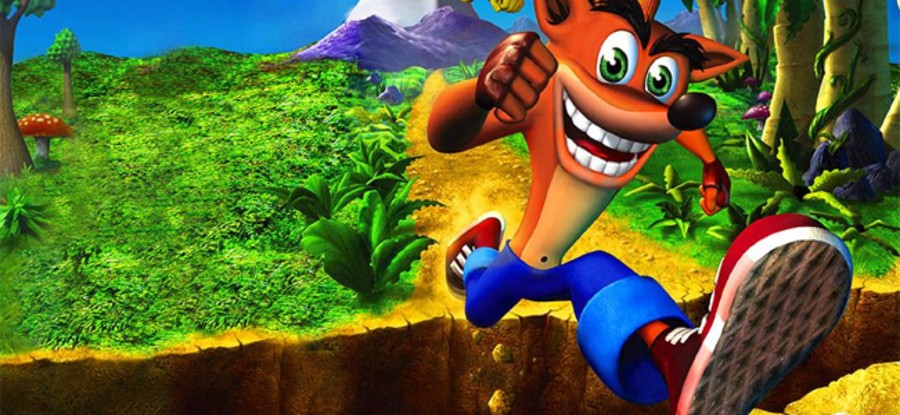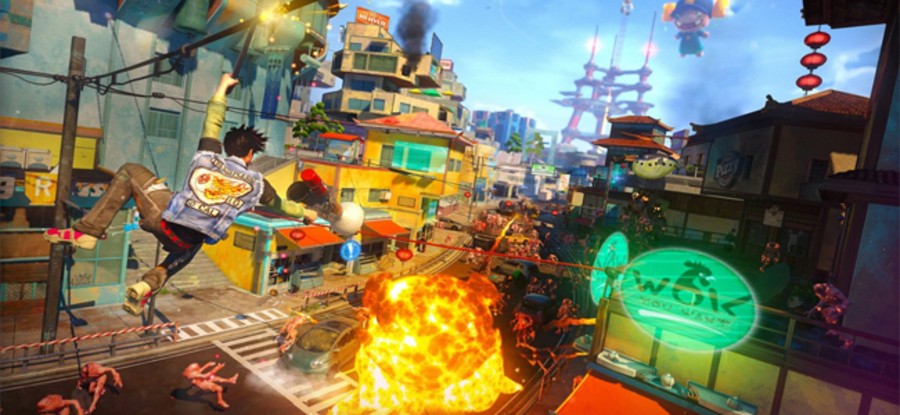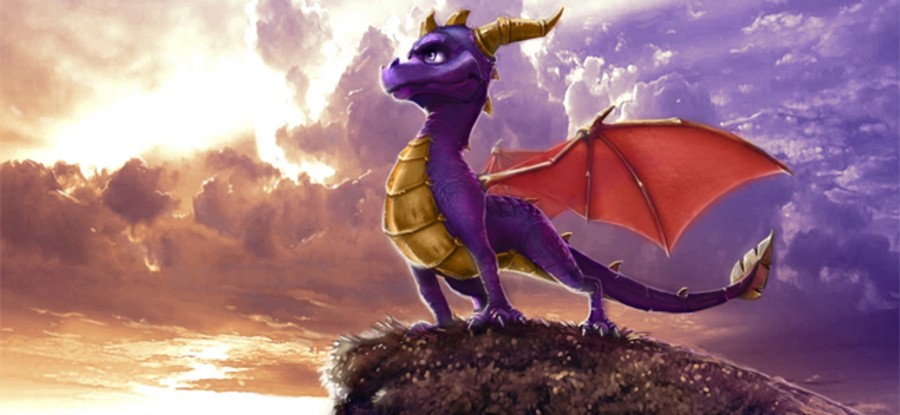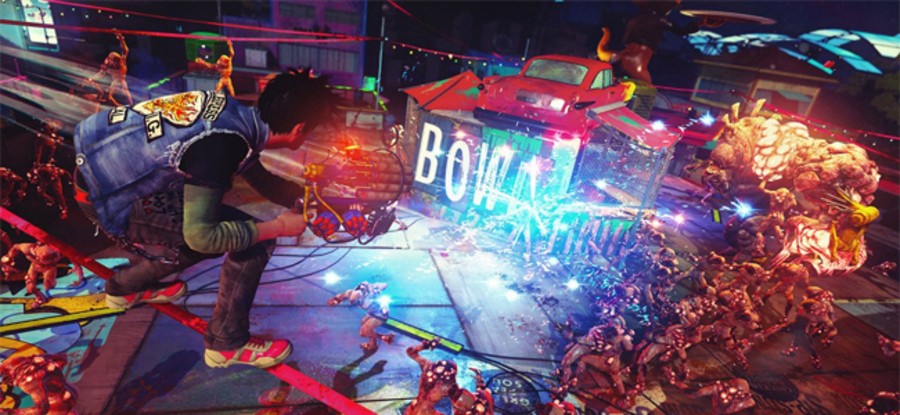
Insomniac Games announced its soda-based sandbox excursion Sunset Overdrive to an explosion of goodwill this week. The colourful Xbox One exclusive harks back to the Dreamcast era, boasting oversaturated skylines and some decidedly SEGA gameplay mechanics. Sporting a system that sees your firepower increase as you combo tricks, it looks like a cross between Tony Hawk's Pro Skater, Ratchet & Clank, and inFAMOUS – a concoction tantalising enough to make this editor thirst for a taste of its bonkers blend. Sadly, with Microsoft publishing, it’s very unlikely that the game will ever arrive on the PlayStation 4 – but with the veteran Burbank-based studio insisting on brand ownership, that is something that could theoretically change.
For many of you, it’s probably strange seeing the seminal Spyro the Dragon studio flogging a non-Sony format in interviews with various multiplatform publications. Despite never being wholly owned by the Japanese giant, the Resistance maker has remained a part of the PlayStation furniture through three entire generations, starting out with Super Mario 64-inspired platformers, before cutting its teeth on the more mature world of the aforementioned first-person property. Whether or not you have an emotional attachment to the outfit’s output, it’s sad to see the seeming breakdown of the company’s longstanding relationship with PlayStation and its fans.
Of course, the firm insists that there’s no bad blood between itself and the platform holder – and we’d hazard that it’s telling the truth. After all, the studio released the middling mini-adventure Ratchet & Clank: Into the Nexus less than six months ago, while it’s still supposedly working hard with the manufacturer to ensure that its delightful double-act’s silver screen debut is a success. However, in all of the interviews that we’ve perused – particularly those where the question about exclusivity has popped up – our snidey sensor couldn’t help but stand on end. This is particularly true in IGN’s report on the situation, where it talks about presenting the property to a variety of publishers.

“We pitched it a few different places, and it was really important to [Insomniac Games’ gaffer] Ted [Price] that we own the intellectual property, so some of the conversations broke down over that,” said co-creator Marcus Smith, who previously worked on Resistance 3. Given the history between the two firms, one of those organisations is almost certain to have been Sony, meaning that there’s probably a good chance that the game could have come to the Japanese giant’s latest machine. However, the PlayStation maker almost always requests ownership of any franchises that it funds, and that’s where the talks are likely to have closed.
“Most publisher conversations begin and end with IP ownership,” added fellow co-creator Drew Murray. “I think that [Microsoft] has been talking to Ted for a while, and at some point it was like, 'You can retain the IP.’ Suddenly, it was a conversation point." While we’re certainly not privy to the binding documents behind the brand, this theoretically means that Insomniac Games can more or less do as it pleases with the property moving forwards, such as producing licensed toys or creating spin-off comic books or cartoon shows. It also means that it would, potentially, be able to take a sequel anywhere, and while it’s likely that Microsoft will have dibs, that’ll depend on the deal.
Considering that it’s currently obligatory to want to take Sony down a peg or two, this has prompted some online pundits to criticise the console maker’s decision to demand control of the franchise – particularly seeing as it’s potentially missed out on a promising exclusive as a result. However, while we’re sad to see Insomniac Games take its wares elsewhere, we’re not sure that we agree – and the Californian company should understand the organisation’s stance better than anyone else. Indeed, back in the early PSone days, the platform holder entered a contract with the Mark Cerny led Universal Interactive Studios, which spawned two household names: the aforementioned Spyro the Dragon and Crash Bandicoot.

While the specifics of that deal are a little hazy, history informs us that the manufacturer – a newcomer to the industry at the time – didn’t retain the rights to either brand, prompting both to more or less wither and die under the ownership of Vivendi Games, which was later to be merged with Activision. It’s the Spyro the Dragon series – originally created by Insomniac Games – that’s seen the most activity of late, acting as a Trojan horse for the Skylanders property which has since become its own thing. Meanwhile, the Naughty Dog developed Crash Bandicoot franchise has been stagnant since the late 2000s, with only rumours of a Sony acquisition lending hope to a comeback.
So, why does this matter? Well, it demonstrates why IP ownership is important after all. PlayStation All-Stars Battle Royale was, for many, a hotly anticipated game, but the absence of two of the brand’s most iconic characters hurt it immeasurably in the build up to release. While we don’t know the full extent of the behind closed doors conversations, we have to imagine that developer SuperBot Entertainment begged Activision to allow it to put Spyro the Dragon and Crash Bandicoot in the game, but the immovable publisher clearly wouldn’t budge. True, the loss of these brands paved the way for properties like Jak & Daxter, but the firm will forever regret not holding on to the icons discussed above.
As good as the game looks, it’s unlikely that Sunset Overdrive will have the lasting legacy of any of the aforementioned games, but this instance hopefully illustrates why it’s important for the publisher to maintain IP ownership. And yet, there’s more. It’s not surprising to see Microsoft be so loose with retaining rights, as this is not the first time that it’s acted in this way. Many of you will recall Mass Effect starting life as one of the Redmond-based manufacturer’s bold new properties, before eventually crash landing on Sony’s citadel a few years later. Gears of War, despite its ties to the Xbox brand, is another franchise that, until recently, was free to go multiformat as well. It cost a rumoured $100 million to finally lock it down.

And while it’s a slightly different situation, there’s the recently released Titanfall, too. This is a franchise that’s almost certainly going to come to the PS4 in the future – in fact, some supposed industry insiders claim that it’s happening faster than you think – which makes Microsoft’s investment look worthless. Some may argue that the exclusivity arrangement hammered out for this game has served the manufacturer well by maintaining mindshare, but that doesn’t seem like a sound investment to us. With the likes of Uncharted, God of War, and Killzone, you know that you’re going to need a PlayStation platform to play them.
So while it’s clear that Insomniac Games and Microsoft are happy with the arrangement regarding the Xbox One’s latest exclusive game, we don’t think that the situation discredits Sony’s policy of retaining IP ownership. The former would probably point to poorly outsourced outings like PlayStation Move Heroes and Resistance: Burning Skies as an example of why it’s unwilling to let the Japanese giant control its franchises moving forwards, while the latter would no doubt highlight the extra exclusive in its console’s catalogue as evidence of why the scenario works. Neither would be wrong, but that doesn’t mean that the PlayStation maker is either. After all, last year’s digital rights management debacle taught us that very few people are willing to pay for something that they don’t really own, so why would a major company happily buck that trend?
Do you think that Sony’s right to retain ownership of the franchises that it funds, or does Sunset Overdrive’s exclusivity demonstrate that it needs to be a little looser with its rules? Shake us up like a can of orange soda in the comments section below.
Do you think that Sony should retain franchise IP ownership? (65 votes)
- Yes, this makes simple business sense
- Hmm, I’m not really sure
- No, all I want are great games to play
Please login to vote in this poll.





Comments 24
Yeah, I wouldn't feel comfortable playing Ratchet on Xbox as much i would feel bizarre play Mario on a Playstation console.
I think it makes simple business sense even though Im not really sure. Anyway all I want are great games to play which I dont think this one is (for me) XD
Good article.
As a side, who else would love to see Crash & Spyro return to their glory PS1 days on PS4 as exclusives? Mario needs some 3d platforming competition, just like back then!!
while this does make sense, i would figure insomniacs long standing relationship with sony would give them some leeway on this. Sunset Overdrive doesnt even look like a game im use to seeing on my xbox. i would think more people that own just a playstation would have picked this up as opposed to those that just own an xbox
the second sentence in this article is definitely true. I never ownd a dreamcast but that console is all i can think about looking at that first screen of Sunset
The title confused me for a bit. I had to read it 3-4 times before I realized it meant "Why Sony IS right..." I thought it was talking about Sony's right to retain franchises it funds.
Well, I'm glad I know why Insomniac jumped ship to Xbox now...and it's a reason I can't really blame them for. I DO blame all involved for Insomniac not just being bought by Sony outright already, though. Naughty Dog and Sucker Punch did...now Insomniac feels like the odd one out from the PS2 platformer trifecta. sigh
As it stands, I do understand and agree with Sony's desire to own things it pays for...but I do feel better about it when they own the developers as well. Then again, I trust Sony to have other devs make good games more than Activision all the same. Whole thing's kind of a mess overall.
Though I think Sony is right, for this particular game I would have preferred a 3rd party publisher to step in and let it be multi-platform as Fuse was. But I guess EA wasn't interested after Fuse turned out the way it did.
Insomniac obviously didn't approve of the management of Ratchet and Resistance, but they also have to look at themselves. It's not like either of those franchises were pulling up trees on PS3 and Sony has to make the most of their investments.
Exactly this nobody could blame insomniac for wanting to own their own ip but without that Sony wouldn't have all the great exclusive games it's got
Really doesn't bother me who owns the game, I just want to play the best games I can on my console and not be bombarded with over hyped average games.
Xbox owners hated all 'insomniac' games in the past but now they seem to think they are 'the best think ever' Odd that;) Anyway if i was a game maker i would want to make my game on the best & more powerful next-gen console so they should of stuck with the PS brand & do the game for the PS4(hopefully they are making a PS4 only R&C game tho, that would be cool)
Funny people would vote that Sony retain franchises rather then having great games to play.. makes me question is this a community of gamers or pure fanboyizm.
@Madd_Hatter401 The poll was probably a bit poorly worded to be fair, so that's partly my fault. That last entry was really meant for people who don't really care about the business side.
It is what it is. Sony certainly has the right to stand their ground with obtaining rights, but they shouldn't be surprised when they see multiple 3rd party exclusives hit X1 and even Wii U due to MS and Nintendo funding games in which they do not retain ownership. And I must say, that Sunset Overdrive is looking good.
And, this is where I start thinking about buying an X1. The 3rd and final missing home console will ensure no matter what platform a game comes to, it'll be 100% playable. Then I won't have to care about articles like this. I can just sit back and eat pizza while the platform holders battle it out for exclusives, then casually waltz into the store and pick it up for whatever console it landed on.
All the business mumbo jumBo aside, I can't wait to play this game ! it looks sick! can't wait to see what else xbox has in store at e3 this year. Sony as well of course.
I hope to see Crash be announced as a Sony IP again. Activision and Sony get along very well and I heard that all mention of Crash on their website has been removed a few months ago so that could be a great sign. I also wish Sony could require Spyro as well.
If Sony pays for development then they should be allowed ownership if they so desired. Also remember Sony unlike MS give their developers great freedom and don't force them to keep making the same game over and over again (remember MS demanding Bungie only make Halo nothing else). Naughty Dog has total freedom and they will tell you that Sony never demanded them to keep making Uncharted games or Rachet and Clank. They allow total freedom and that is why their own developers are very happy to be owned by Sony.
Cheers!!!
Graf
It's understandable from both sides. The unfortunate part is this possibly cost Sony a good game and even if it was only timed exclusive that's better than nothing but doesn't matter at this point, I'll just get the game when I eventually get an X1 or if a PS4 port does happen before that I'll pick the game up then.
I think someone should step up, like Sanzaru did for Sly, and offer to bring back Crash and Spyro. Maybe Activision can bring vanilla PS1 era Spyro to the Vita (and why aren't those games on the Vita PSN?!), and the same goes for Crash (and do I need to repeat myself?).
I hate exclusives there's no reason why games should be limited to hardware
@DaftPlayStation
What about 1st-party exclusives? Why would Sony put Uncharted on Xbox if their goal is to sell Playstations? It doesn't work for PC because no one company owns it.
Its a two-way street, it can be good for the developers as well as the publishers, but it can go south as well. It really sucks when an IP is stuck in limbo no matter how much fans or the developers want to work on it (do I even need to say who?).
I wouldn't go so far as to call it anti-consumer though because every business has its secret sauce. Why do you eat at one restaurant over another? Because they offer something the others don't.
@Zombie_Barioth Well yeah i meant all games includeing 1st-party's I've never thought of it that way before I've always wondered why is it that games are still the only forme of media that require people to buy specific proprietary hardware just to play them it makes no sense it's stupid and obsolete to me i don't need to buy a specific kind of CD player just to listen to a certain CD i don't need to buy specific kind of DVD or Blue-Ray player just to watch a certain movie or Tv show i don't even need to buy a specific kind of proprietary hardware just to listen to music or watch a movie or tv show when music movies and tv shows can all be downloaded or streamed to any kind of digital device that's capable of supporting it
I wish Nintendo hadn't let rare keep the Banjo Kazooie ip then there would be a truly worthy sequel to Banjo Tooie lol
@get2sammyb I apologize if I came across as a jerk lol I just love gaming on all consoles and personally just want great games across all spectrums.. except mobile "gaming" which is slowly destroying the industry
@Bliquid I am not downing the the quality of mobile games but the practice in which alot of them make money. It has made its way into console gaming, ie micro transactions, and I in absolutely no way disagree with you're views on demos being passed off as games! I see where you are coming from in you're defense and agree its not just mobile gaming but greed and the works of those in the gaming industry as a whole.
@Madd_Hatter401
At brand specific websites there's always going to be fanboys. Fanboy traffic has picked up around here, but still actually isn't too bad compared to some others. Even if you don't care for Nintendo at all, I'd say just check out Nintendo Life if you have the time, great website and there's a group of people who post there as well as here who are just passionate about gaming but the amount of fanboys is crazy. There's also a North American PS website I go to that loves to feed the 'console war' nonsense and most people there get pissed if you post something about Xbox that doesn't totally trash it. I always expect results in polls to go the way they did in this one and like you, I'd just prefer good games, but I thought Sammy presented a well-balanced argument in the article and from the business side of it, it makes sense for Sony to want to control the IP as, especially if the game ends up being a hit, it could be the start of a new franchise that helps define the console.
Leave A Comment
Hold on there, you need to login to post a comment...